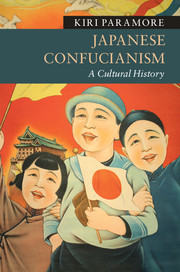Book contents
- Frontmatter
- Epigraph
- Contents
- List of figures
- List of maps
- Acknowledgments
- Notes on the text
- Timeline
- Maps
- Introduction
- 1 Confucianism as cultural capital (mid-first millennium CE–late sixteenth century CE)
- 2 Confucianism as religion (1580s–1720s)
- 3 Confucianism as public sphere (1720s–1868)
- 4 Confucianism as knowledge (1400s–1800s)
- 5 Confucianism as liberalism (1850s–1890s)
- 6 Confucianism as fascism (1868–1945)
- 7 Confucianism as taboo (1945–2015)
- Epilogue: China and Japan: East Asian modernities and Confucian revivals compared
- Notes
- Works Cited
- Index
Epilogue: China and Japan: East Asian modernities and Confucian revivals compared
Published online by Cambridge University Press: 05 April 2016
- Frontmatter
- Epigraph
- Contents
- List of figures
- List of maps
- Acknowledgments
- Notes on the text
- Timeline
- Maps
- Introduction
- 1 Confucianism as cultural capital (mid-first millennium CE–late sixteenth century CE)
- 2 Confucianism as religion (1580s–1720s)
- 3 Confucianism as public sphere (1720s–1868)
- 4 Confucianism as knowledge (1400s–1800s)
- 5 Confucianism as liberalism (1850s–1890s)
- 6 Confucianism as fascism (1868–1945)
- 7 Confucianism as taboo (1945–2015)
- Epilogue: China and Japan: East Asian modernities and Confucian revivals compared
- Notes
- Works Cited
- Index
Summary
Song dynasty Confucians used Buddhism to construct a new philosophy, a kind of “Buddhism in Confucian Clothes” which reached fulfillment in the Ming dynasty.
– Liang Qichao (1873–1929), Chinese political thinker and modernizer, describing Neo-Confucianism in “Qingdai xueshu gailun” [General Discussion of Qing Dynasty Learning] (Liang 1985: 7)Two modernities, two Confucianisms
Ever since the systematization and standardization of its textual apparatus in the Han dynasty, two contrasting inclinations have been consistently identified in Confucianism: (1) the idealistic Confucianism of individual moral betterment, which assumed innate human goodness, was associated with Mencius as a text and later Neo-Confucianism as a movement; and (2) the instrumentalist Confucianism of political realism, which emphasized the pragmatism of the “ancient” Chinese sovereigns, was associated with Xunzi as a text, but also with elements in the Old Text movement in Han China, their followers, and innovators in Qing China, and Ogyū Sorai and Japanese Confucianism from the 1700s onwards. It is important to note that these two different and sometimes contradictory inclinations are discernable through most of the history of Confucianism post-Han. The persistence of both inclinations through over two millennia of history indicates that the difference between them is not simply genealogical but also deeply epistemological.
The presence of these two differing approaches throughout Confucianism's premodern history also demonstrates the inherent plurality that the tradition possessed before modernity. Scholars of religion today tend to agree that most religious traditions tolerated greater plurality in their premodern manifestations than after religious modernization. Historical and theoretical writing on religion and political thought over the past decades has demonstrated that the processes of religious modernization usually reduced tolerance for internal pluralism. Religious modernization, certainly in Asia, usually involved setting the parameters of a tradition in a more fixed and singularly defined manner. It was this religious and political modernization which led to the fluid plurality of Confucianism previously shared by both China and Japan being transformed into fixed, more singularly defined forms. And it was precisely in this process of modernist reconstruction that clearly differing forms of Confucianism crystallized in the two countries.
As pointed out in Chapters 5 and 6, in Japan it was the latter, politically realist inclination of Confucianism which informed the formation of the modern Japanese Confucianism of the early twentieth century.
- Type
- Chapter
- Information
- Japanese ConfucianismA Cultural History, pp. 183 - 191Publisher: Cambridge University PressPrint publication year: 2016



